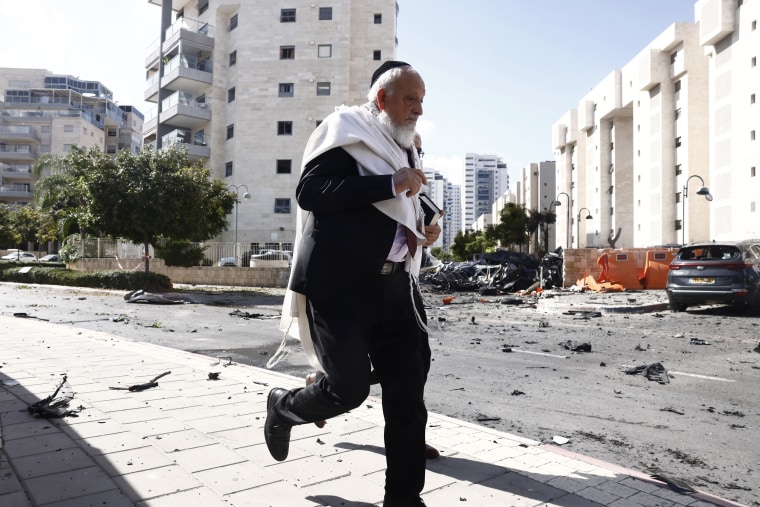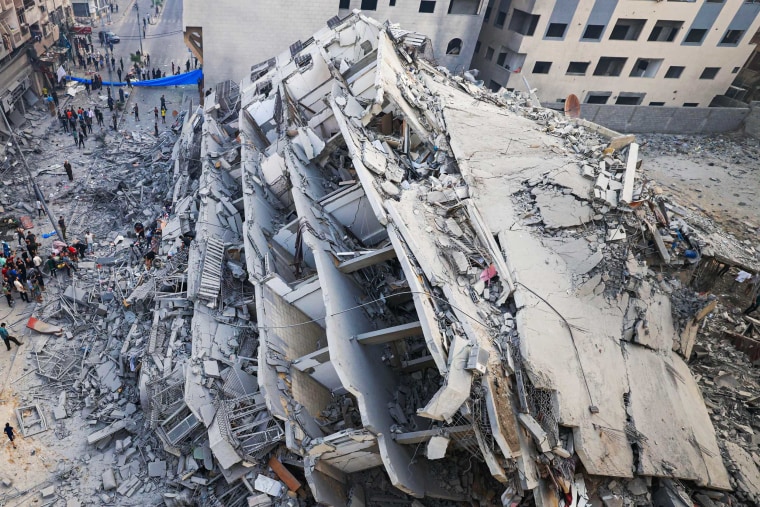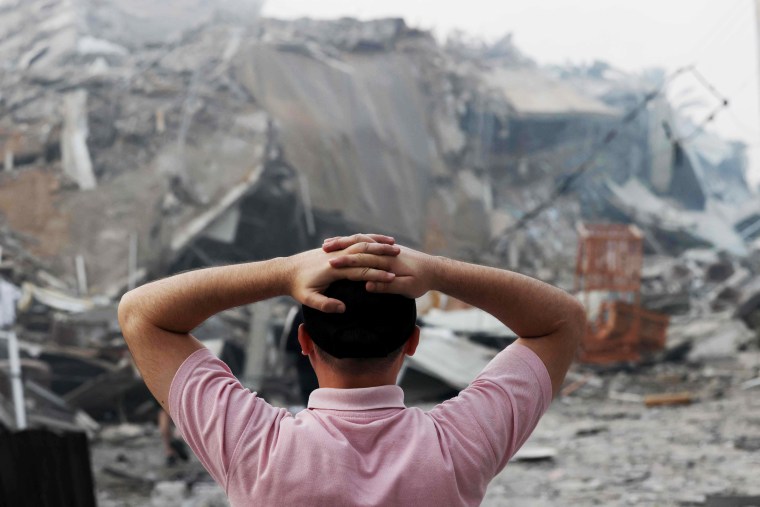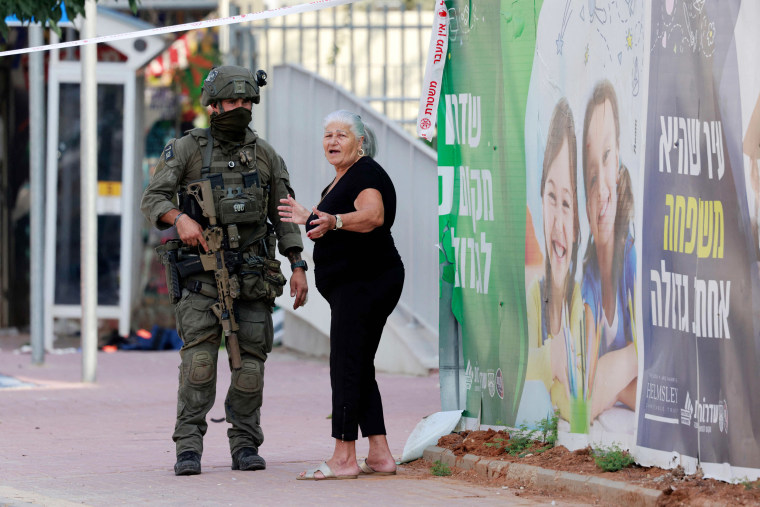Israel was in a state of shock and a state of war Sunday after an unprecedented attack that saw Hamas fighters rampage through the country's south, killing hundreds and seizing hostages in a surprise breakout from Gaza.
Prime Minister Benjamin Netanyahu warned of a "long and difficult war" to come, as his military continued battling to drive out militants while launching deadly retaliatory strikes on the densely populated coastal enclave.
The Palestinian militant group's daring land, air and sea operation left Israel reeling and threatened the gravest escalation in the region in decades.

Death toll mounts in Israel and Gaza
More than 700 people were killed in Israel after Hamas fired thousands of missiles and sent gunmen through the security barrier into the country's south, according to the Israeli Defense Forces.
Early Sunday, Israeli forces said they were still fighting to regain control of eight areas of the country's territory from Hamas militants.
Retaliatory bombardment, including by Israeli fighter jets, killed at least 413 including 78 children and 41 women, the Palestinian health ministry said.
Those death tolls were expected to rise significantly as Israel, stunned from a violent incursion of its territory not seen since the state's earliest days, took stock and vowed to take "mighty vengeance."
Netanyahu said that "the enemy will pay a price it has never known before," warning Palestinians in Gaza to leave immediately. Israel's security cabinet had formally approved a "war situation," the government announced.
The 2.3 million residents of the tiny coastal enclave of Gaza have long been blockaded and closed off by a security fence. Israel has now also begun cutting off energy supplies and the flow of goods to the densely populated strip of land.

The Israeli response will be complicated by Hamas' capture of dozens of Israeli hostages, both civilian and military, which saw women and children among those taken to Gaza.
Social media and Israeli TV was filled with accounts from devastated family members fearing for loved ones who had been seized by gunmen in their homes, amid fears they could be used as bargaining chips to trade for Palestinian prisoners or deter any Israeli ground assault.
The attacks represent the most dangerous escalation in the conflict in decades and come almost exactly 50 years after the Arab-Israeli War in 1973, when Israel was similarly taken by surprise in a sudden attack by neighboring Egypt and Syria.
Concerns of a broader conflict were fueled Sunday by flare-ups in the north, where Israel exchanged strikes across the Lebanon border with the Hezbollah militant group, and in Egypt, where two Israelis and their guide were killed when an Egyptian citizen opened fire at a group of tourists in Alexandria, Israel's Foreign Ministry said.
Israel appeared to be caught off guard by the coordinated attacks, raising questions about how vaunted intelligence agencies both there and in the United States failed to raise the alarm.
Bracha Yarkoni, 75, watched as her home in the southern coastal city of Ashkelon took a direct hit from a rocket. Already woken on her birthday by the sound of explosions and the cries of her grandchildren, she watched from the street as the missile hit. “God help us,” she said.
President Joe Biden joined world leaders in condemning the attack, declaring that his administration's "support for Israel’s security is rock solid and unwavering."
The outbreak of intense fighting in the Middle East will test his foreign policy case for re-election in 2024.
The situation will be made more volatile by Israel's nationalist government — stung by presiding over such national trauma — and the despair of Palestinians suffocated by the yearslong blockade of Gaza and Israeli occupation of the West Bank.

Hamas claimed it was taking revenge for a series of recent actions by Israel at Jerusalem’s Al-Aqsa mosque and in the West Bank, where residents have reported rising attacks on settlers, for which Palestinians blame Israel's right-wing government.
The assault follows a period of heavy fighting in the West Bank, where nearly 200 Palestinians were killed in Israeli military raids this year, according to U.N. Mideast Envoy Tor Wennesland. Israel says the raids are aimed at militants, but stone-throwing protesters and people uninvolved in the violence have also been killed.
Palestinian attacks on Israeli targets have killed over 30 people so far in 2023, Wennesland said in an August briefing to the U.N. Security Council.
Analysts warned that this weekend's outbreak of warfare would not be short-lived.
Efraim Inbar, president of the Jerusalem Institute for Strategy and Security, a conservative think tank, said he expected a full-scale invasion of Gaza would follow, with the explicit goal of removing Hamas from power.
“If I read correctly what the prime minister said and if I read correctly the rage amongst the people, then we [will] have a war, which means land invasion, use of air force and everything we have at our disposal, to get the Hamas leadership,” he told NBC News by phone.

On the Palestinian side, even those not affiliated to Hamas blame Israel's occupation of Palestinian territory and the blockade of Gaza for prompting Saturday's attacks.
"We’ve been under military Israeli occupation for 56 years. Nobody cares about ending that occupation," said Mustafa Barghouti, a veteran Palestinian political activist.
"For years we’ve been paying the price. Palestinians are dying every year. The main difference today is that both Palestinians and Israelis are dying. We don’t want anybody to die. I do not want any Palestinian or Israeli to die. But the road to end this situation, to end any form of violence, is to end occupation."
Tensions have been rising for months and grievances simmering for years, but Netanyahu has been pursuing ambitious goals at home and abroad that largely sidelined the Palestinian issue — judicial reforms that fueled mass domestic unrest and a deal to normalize relations with Saudi Arabia.
Former U.S. intelligence and military officers told NBC News Saturday that the attacks may have been timed in part to disrupt any U.S.-brokered Israeli-Saudi agreement — a historic step analysts see as a result of a shared desire to counter Iran.
What seems clear is the violence will not end here.
